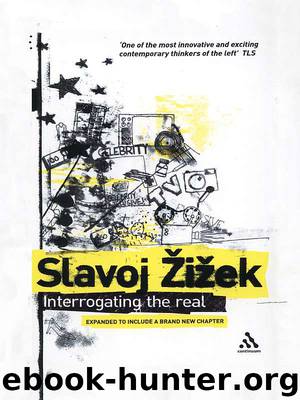Interrogating the Real by Slavoj Zizek

Author:Slavoj Zizek
Language: eng
Format: epub
Publisher: Continuum Books.
Published: 2011-04-12T16:00:00+00:00
II
So in what, exactly, does the difference between Lacan and deconstruc-tion reside? Let me elaborate this crucial point apropos the Derridean couple, ‘supplement/centre’. In a way reminiscent of the Foucauldian endless variations on the complex heterogeneity of power relations (they run upwards, downwards, laterally), Derrida also likes to indulge heavily in exuberant variations on the paradoxical character of the supplement (the excessive element which is neither inside nor outside; it sticks out of the series it belongs to and simultaneously completes it, etc.). Lacan, on the contrary – by means of a gesture which, of course, for Derrida would undoubtedly signal reinscription into traditional philosophical discourse – directly offers a concept of this element, namely the concept of the Master-Signifier, S1, in relation to S2, the ordinary’ chain of knowledge. This concept is not a simple unambiguous concept, but the concept of the structural ambiguity itself. That is to say, Lacan reunites in one and the same concept what Derrida keeps apart. In Lacan, S1 stands for the supplement – the trait which sticks out, but is as such, in its very excess, unavoidable – and, simultaneously, for the totalizing Master-Signifier. Therein, in this ‘speculative identity’ of the supplement and the Centre, resides the implicit ‘Hegelian’ move of Lacan: the Centre which Derrida endeavours to ‘deconstruct’ is ultimately the very supplement which threatens to disrupt its totalizing power, or, to put it in Kierkegaardese, supplement is the Centre itself ‘in its becoming’. In this precise sense, supplement is the condition of possibility and the condition of impossibility of the Centre.
Mutatis mutandis, the same goes for the couple, ‘voice/writing’. In his deconstruction of western logo-phono-centrism, Derrida proposed the idea that the metaphysics of presence is ultimately founded upon the illusion of ‘hearing-oneself-speaking [s’entendre-par1er]’, upon the illusory experience of the Voice as the transparent medium that enables and guarantees the speaker’s immediate self-presence. In his theory of voice as a partial object (on a par with other such objects: breasts, faeces), Lacan supplements Derrida with the Hegelian identity as the coincidence of opposites. True, the experience of s’entendre-parler serves to ground the illusion of the transparent self-presence of the speaking subject. However, is not the voice at the same time that which undermines most radically the subject’s self-presence and self-transparency? Not writing, which undermines the voice as it were from without, from a minimal distance, but the voice itself, one is tempted to say: the voice as such in its uncanny presence – I hear myself speaking, yet what I hear is never fully myself but a parasite, a foreign body in my very heart. In short, voice is that on account of which ‘I can’t hear myself think’, so that the subject’s basic plea to their voice is, ‘Would you please shut up, I can’t hear myself think!’ This stranger in myself acquires positive existence in different guises, from the voice of conscience to the voice of the persecutor in paranoia. The voice’s ‘self-identity’ resides in the fact that the voice
Download
This site does not store any files on its server. We only index and link to content provided by other sites. Please contact the content providers to delete copyright contents if any and email us, we'll remove relevant links or contents immediately.
Cecilia; Or, Memoirs of an Heiress — Volume 1 by Fanny Burney(32559)
The Great Music City by Andrea Baker(32021)
Cecilia; Or, Memoirs of an Heiress — Volume 2 by Fanny Burney(31957)
Cecilia; Or, Memoirs of an Heiress — Volume 3 by Fanny Burney(31943)
We're Going to Need More Wine by Gabrielle Union(19050)
All the Missing Girls by Megan Miranda(16036)
Pimp by Iceberg Slim(14514)
For the Love of Europe by Rick Steves(14144)
Bombshells: Glamour Girls of a Lifetime by Sullivan Steve(14078)
Talking to Strangers by Malcolm Gladwell(13374)
Norse Mythology by Gaiman Neil(13372)
Fifty Shades Freed by E L James(13245)
Mindhunter: Inside the FBI's Elite Serial Crime Unit by John E. Douglas & Mark Olshaker(9345)
Crazy Rich Asians by Kevin Kwan(9295)
The Lost Art of Listening by Michael P. Nichols(7507)
Enlightenment Now: The Case for Reason, Science, Humanism, and Progress by Steven Pinker(7315)
The Four Agreements by Don Miguel Ruiz(6766)
Bad Blood by John Carreyrou(6624)
Weapons of Math Destruction by Cathy O'Neil(6282)
